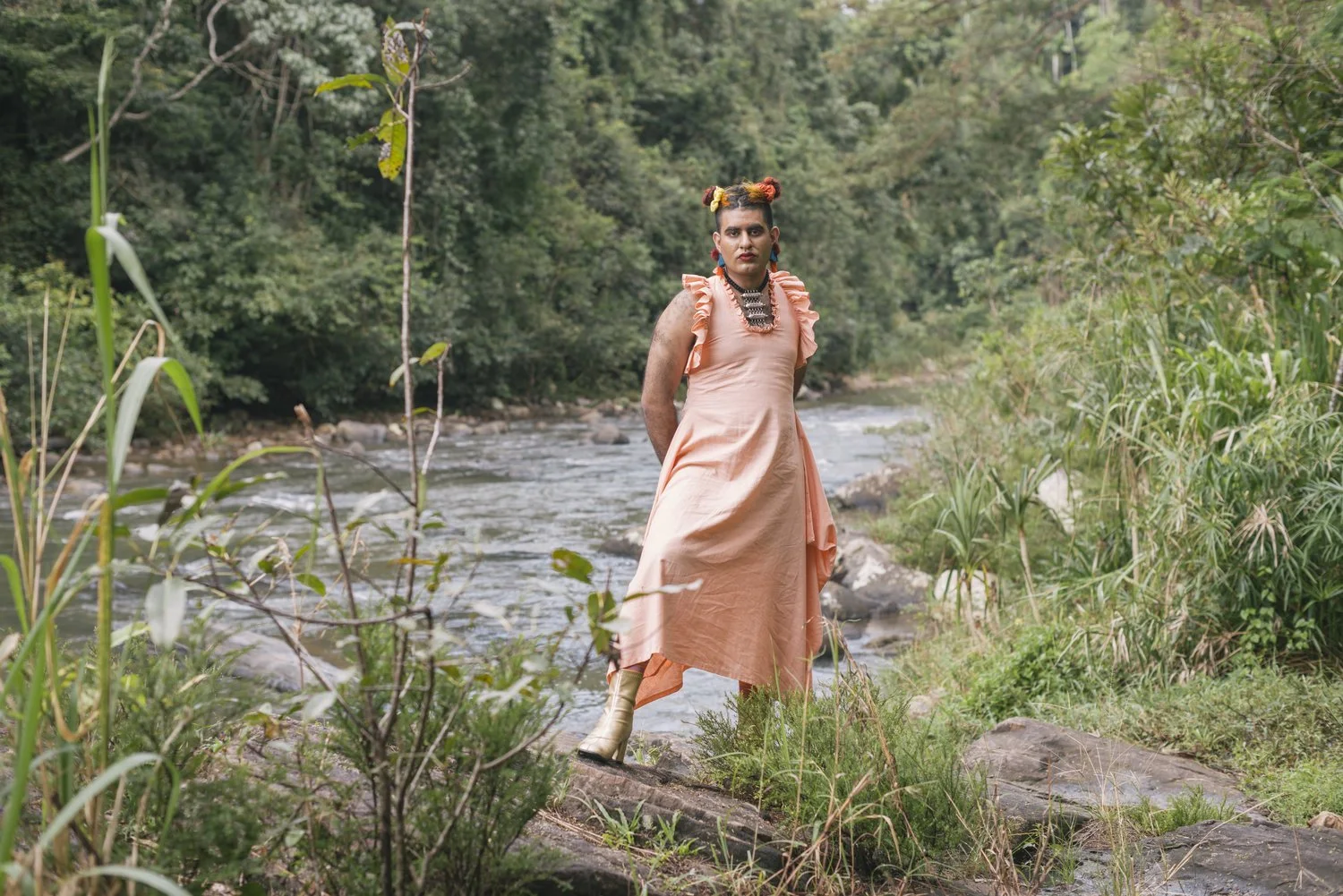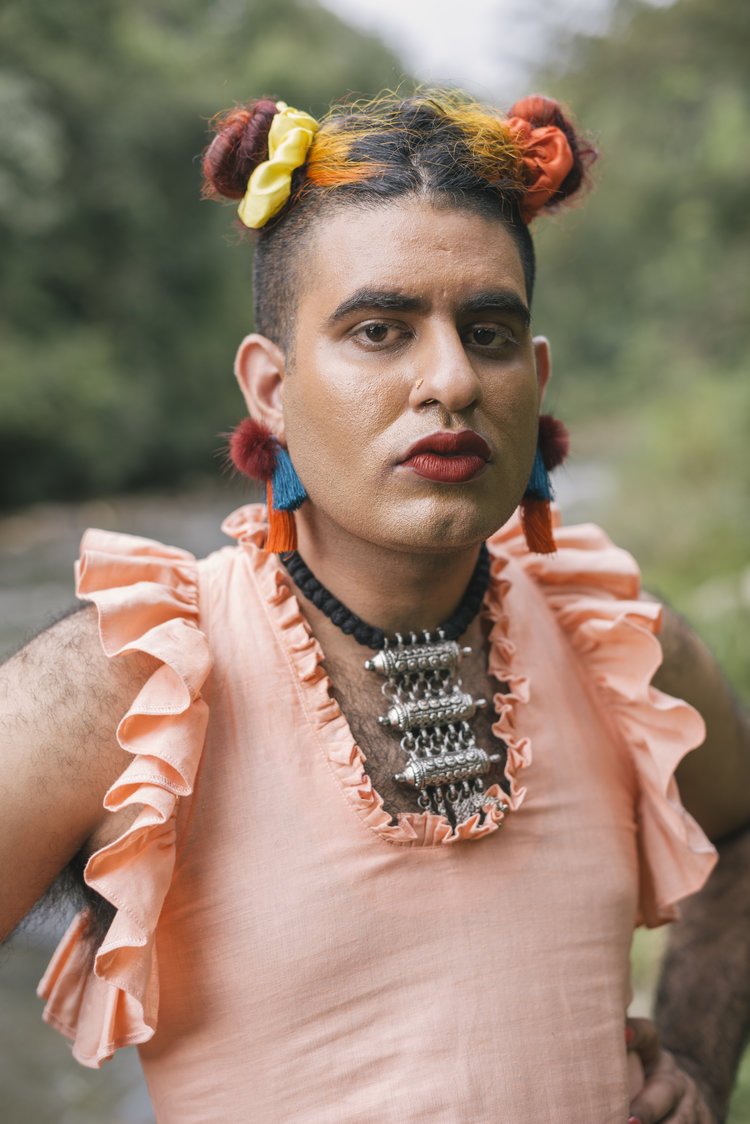How Art Created Alok Vaid-Menon
Making any type of art as a queer person, as any person, doesn’t just have to do with putting beauty forth or accomplishing a kind of celebrity in the larger world -- sometimes it is fundamentally a tactic of surviving in what seems like an otherwise unsurvivable world. An artist who knows this first hand is Alok Vaid-Menon. A poet, performance artist, and proud nonbinary trailblazer and activist, Vaid-Menon has not always been the vibrantly technicolored global speaker we know them as now. In fact, they’ve lived within the confines of fear for years.
Growing up in a rural Texas town, Vaid-Menon was not only a person of color in a predominantly white area, but also struggled with presenting themselves as they truly knew they were -- as happily blurring the lines between what’s traditionally recognized as the (often stringent) presentations of the masculine and feminine.
Now out as nonbinary, Vaid-Menon is setting their own rules as to what their style is, what needs to be discussed regarding the rampant violence against not only the LGBTQ community, but trans people in particular, especially trans people of color, and what it’s like to live in fear of everyday tasks like walking down the street in their own neighborhood.
Vaid-Menon embodies the kind of activist that our community needs so dearly. We had the chance to discuss their poetic practice, feelings of otherness, and their means of survival in a society that often mocks. In true poet form, they did not disappoint.
—
Tell us a little about your background. What was it like growing up in a conservative area being a nonbinary person of color? Do you remember when you started feeling this "otherness"? And what was that like?
On the one hand I had to face constant erasure, invalidation, and hostility. On the other hand: I learned from an early age a type of confidence and determination that I still carry with me today. I developed lifelong friendships with people who had and will always have my back.
PHOTO: CHRISTIAN HUTTER
Otherness was what we grew up with in my tight-knit Indian community in our predominantly white town. Some of my earliest memories were my classmates commenting on how strange/wrong/ugly/smelly my people were. We’re talking at four years old being told: ‘Why don’t you wash your body, so that brown dirt can come off?’
Rather than being a site of refuge and comfort, the Indian community became one of the fiercest spaces of gender policing. As a response to racism my community responded with heteronormativity – ‘maybe if we don’t look or act different they will leave us alone.’
From a young age I was assigned loneliness. And in this isolation I had to learn how to be abundant and resourceful. This is how I developed my art practice: desperation. I desperately wanted to be felt, to be understood, to be real.
Could you tell us about how you process living with fear as an out and proud nonbinary POC? What do you hope to see change?
I wish that I could exist in public without being afraid for my safety. I wish that this world would afford complexity and compassion toward people like me. I wish that we did not have to re-traumatize ourselves, make a commodity out of our pain, in order to be believed, respected, let alone legitimated. I wish that people would honor our artistry and our contributions. I wish that my appearance was irrelevant to my personhood.
I don’t process the fear well. It tears me apart. This year I have been focusing more on rejuvenation. It feels like some of the most difficult work I have ever done.
What do you aim to do with your platform, specifically for the queer community?
It constantly changes. Right now I want us to be more honest about mental health. I want to obliterate the stigma of talking about pain, loneliness, fear, lack. I want to cultivate a commitment to one another beyond the binaries we have inherited: male/female of course, but also triumph/tragedy, mind/body, out/in, liberated/oppressed.
What do you recommend for others who may be struggling to accept themselves and their identity?
Enmesh yourself with people who do not care about what you look like and have a practice of care for you that is not dependent on your ability to be something that you are not. Self-actualization, I think, comes from and through needing and being in communion with others. Find your Other others. The people who have been disenfranchised from the norm. Come together and imagine something else.
PHOTO: CHRISTIAN HUTTER
Did you start writing poetry as a way to cope with feeling like an outsider?
Yes, but calling it a coping strategy doesn’t quite capture the urgency of it. It was more like: a survival strategy. Without my art practice I wouldn’t be alive. Making art gave me the permission to live. I needed somewhere to put the pain. I needed to create images and words and feelings that allowed me to exist. I couldn’t express myself outwardly without fear of violence. So my art practice was where and how I came to life.
There was no one around me who looked and thought and dreamt like me. I was denied representation and templates. I was actively punished for daring to think or exist otherwise. The education I was indoctrinated into taught me that I [was] wrong. My art practice allowed me to do the collage-work of taking something from here, and something from there, and putting them all together such that the final product became larger and more tremendous than the sum of their parts. Which is, I suppose, my way of saying that it feels wrong to say that I created my art. I think my art created me.
How has this method of communication and language helped to shape and transform you as an adult?
I had a vivid imagination. My mind was one of the only safe spaces I had for expression and creativity. Being able to envision things internally allowed me to scaffold out my life and what I wanted to materialize in the world. Cultivation of self-awareness allowed me to figure out what I wanted and needed. It gave me direction and purpose that have been so central to my composite today.
Are there specific pieces you remember being hesitant to share at first? Is there a poem that still makes you nervous to share?
I would say the hesitancy is not so much about particular pieces, and more about speaking truth more generally. We are so incentivized in this world to keep quiet and to lubricate the status quo. Poetry in its most engaging form is honest. Ruthlessly so. Being honest is difficult because you know there might be resistance. And there almost always is. I’ve loved to embrace the hesitancy, the awkwardness, the reservation. It just gets worse when we pretend it isn’t there.
Don’t miss Alok Vaid-Menon at Femme in Public, hosted by WUSSY at 7 Stages Atlanta this Friday, June 21st. Click here to find more info and ticketing.
—
Dakota is a poet, journalist, and right in the damn center of the Kinsey scale. Follow her on Twitter: @Likethestates.
Archive
- September 2025
- August 2025
- May 2025
- February 2025
- November 2024
- October 2024
- September 2024
- August 2024
- July 2024
- June 2024
- May 2024
- April 2024
- October 2023
- July 2023
- June 2023
- May 2023
- April 2023
- March 2023
- February 2023
- June 2022
- April 2022
- March 2022
- January 2022
- December 2021
- October 2021
- September 2021
- August 2021
- July 2021
- June 2021
- May 2021
- April 2021
- March 2021
- February 2021
- January 2021
- December 2020
- October 2020
- September 2020
- August 2020
- July 2020
- June 2020
- May 2020
- April 2020
- March 2020
- February 2020
- January 2020
- December 2019
- November 2019
- October 2019
- September 2019
- August 2019
- July 2019
- June 2019
- May 2019
- April 2019
- March 2019
- February 2019
- January 2019
- December 2018
- November 2018
- October 2018
- September 2018
- August 2018
- July 2018
- June 2018
- May 2018
- April 2018
- March 2018
- February 2018
- January 2018
- December 2017
- November 2017
- October 2017
- September 2017
- August 2017
- July 2017
- June 2017
- May 2017
- April 2017
- March 2017
- February 2017
- January 2017
- December 2015
- November 2015
- October 2015
- September 2015
- August 2015
- July 2015
- June 2015
- May 2015
- April 2015










